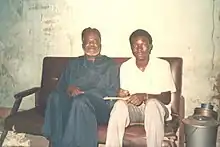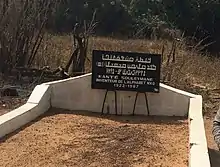
Solomana Kante and Baba Diane

Map of the life of Sulemaana Kante, inventor of the N'ko alphabet

Grave of Solomana Kanté
Solomana Kanté (also written as Sùlemáana Kántε,[1] Souleymane Kanté or Sulemaana Kantè; N'Ko: ߛߎ߬ߟߋ߬ߡߊ߬ߣߊ߬ ߞߊ߲ߕߍ߫, 1922 – November 23, 1987) was a Guinean writer, neographer, and educator,[2] best known as the inventor of the N'Ko alphabet for the Manding language varieties of Africa.
Kanté created N'Ko, a modern script for, as he saw it,[3] the Manding language in 1949 after five years of experimentation with various writing systems.[1] The script first came into use in Kankan, Guinea and was disseminated from there into other Manding-speaking parts of West Africa.
References
- 1 2 Donaldson, Coleman (2020). "The Role of Islam, Ajami writings, and educational reform in Sulemaana Kantè's N'ko". African Studies Review. 63 (3): 462–486. doi:10.1017/asr.2019.59. ISSN 0002-0206.
- ↑ Vydrin, Valentin (1999). Manding-English Dictionary : (Maninka, Bamana). Lac-Beauport. p. 8. ISBN 9780993996931. OCLC 905517929.
{{cite book}}: CS1 maint: location missing publisher (link) - ↑ Donaldson, Coleman (2017-01-01). "Orthography, Standardization, and Register: The Case of Manding". In P. Lane, J. Costa, & H. De Korne (Eds.), Standardizing Minority Languages: Competing Ideologies of Authority and Authenticity in the Global Periphery (Pp. 175–199). New York, NY: Routledge. (2).
Sources
- Conrad, David C. (2001). "Reconstructing Oral Tradition: Souleymane Kanté’s Approach to Writing Mande History". Mande Studies 3, 147–200.
- Kaba, Diaka Laye (1992). "Souleymane Kanté: l’inventeur de l’alphabet N’ko". L’Educateur: Trimestriel Pédagogique des Enseignants de Guinée 11–12, 33
- Kanté, Bourama (1996). "Souvenir de Kanté Souleymane". Somoya Sila: Journal Culturel de l'Association ICRA-N'KO 19.
- Kanté, Souleymane (1961). "Alphabet de la langue N’ko: ‘N’ko sebesun’." In Méthode pratique d’écriture N’ko. Kankan, reprinted by Mamady Keita (1995), Siguiri.
- Vydrine, Valentin, ed. (2001). "Lettres de Souleymane Kanté et Maurice Houis". Mande Studies 3, 133–146.
This article is issued from Wikipedia. The text is licensed under Creative Commons - Attribution - Sharealike. Additional terms may apply for the media files.